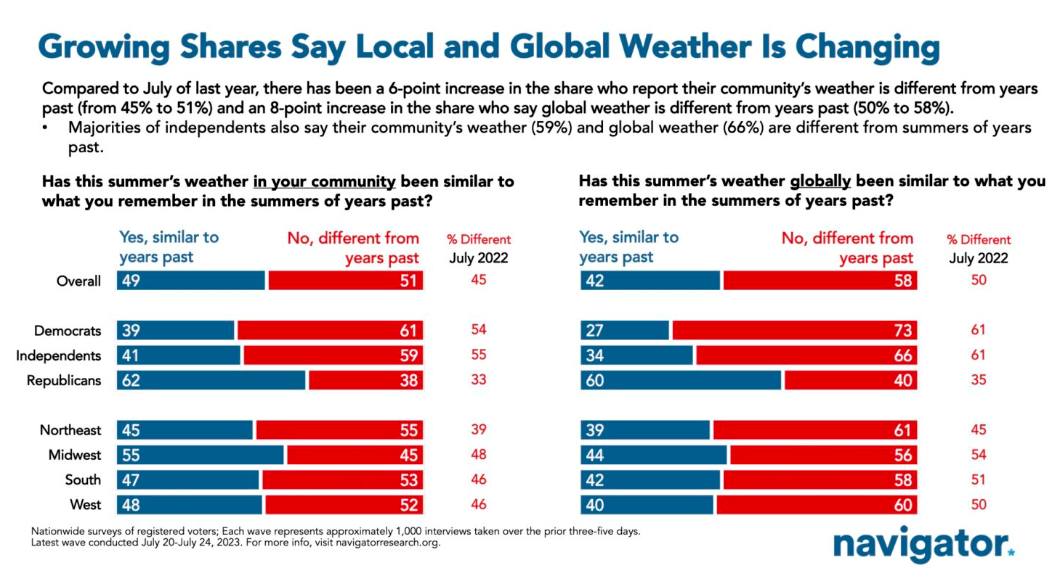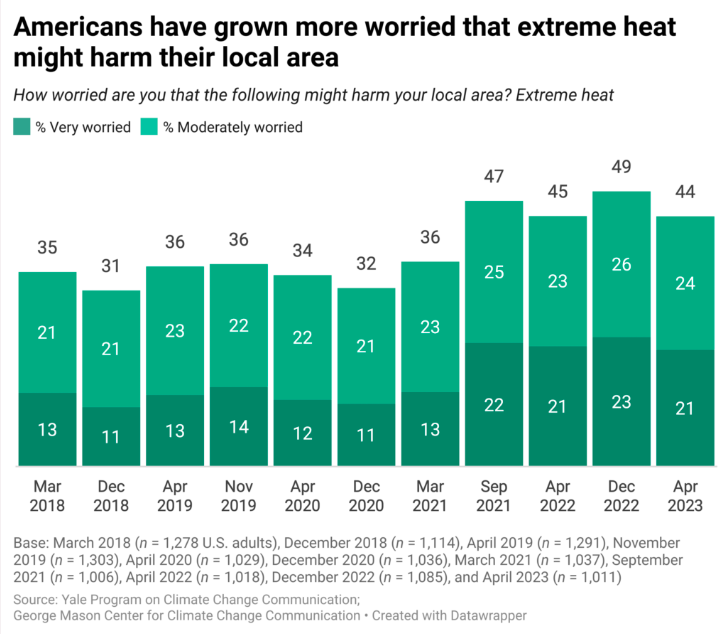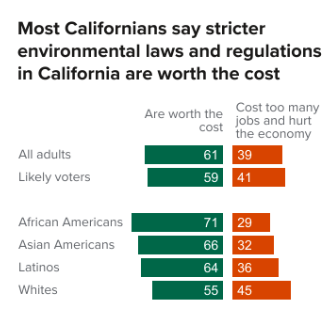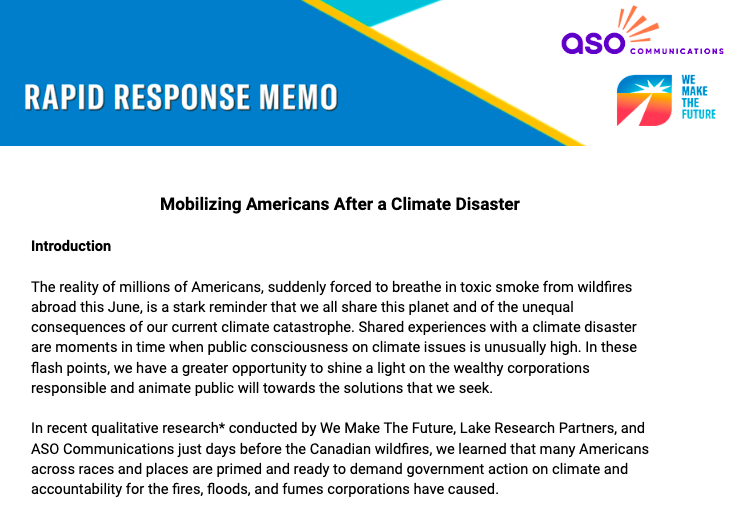Resources
Search below for resources covering the intersection of climate engagement, social science and data analytics.
RESULTS
More voters report unusual weather this summer than last summer, especially extreme heat. Those affected overwhelmingly blame it on climate change. 79% of voters support the United States using more clean energy like wind and solar so we can reduce the pollution that causes climate change. Voters have overwhelmingly positive opinions of clean energy companies (72% favorable / 16% unfavorable), while oil and gas companies are underwater (42% favorable / 48% unfavorable). 79% of Americans say hotter weather has impacted their communities this year. 51% say heat this summer has been different from years past.
Poll: Americans are becoming more worried about extreme heat
Many Americans are worried about extreme heat and understand it is affected by climate change. In Spring 2023, this research found that most Americans (72%) are at least “a little” worried about extreme heat harming their local area – and extreme heat tops the list of worries about climate impacts (e.g., droughts, flooding, water shortages). Additionally, a large majority of Americans (75%) think that global warming is affecting extreme heat at least “a little,” including 42% who say global warming is affecting it “a lot.” Over the past five years, Americans have grown more worried that extreme heat might harm their local area, increasing +9 percentage points from 35% in March 2018 (13% “very;” 21% “moderately”) to 44% in April 2023 (21% “very;” 24% “moderately”). The percentage of Americans who are “very” worried about extreme heat harming their local area has also increased over time (+8 points).
Record-breaking heat changes the climate discourse online
Effects of the climate crisis and various political responses have captured attention on social media and online news media recently. Several Instagram posts about the global record-breaking heat this month went viral – and they exemplify a key issue that the climate world is facing: how do we talk about the climate crisis without making people feel too doomed or helpless in the face of it? Seventh Generation, an eco-friendly paper, cleaning, and personal care product corporation, is running ads in favor of the Green New Deal. Presidential candidate and conspiracy theorist RFK Jr. is a staunch believer in climate change… but he also thinks it’s being used to impose totalitarian control, according to social media posts. The FTC is reviewing its “Green Guides” for the first time in nearly a decade.
Poll: Amid heat wave, more Americans say climate change has 'made things worse' in their lives
Most American say that climate change is contributing to the Southwest heat wave, and a growing share say that climate change has made things worse in their lives. 55% of Americans recognize that climate change is contributing to extreme weather events such as the heat wave across the Southwest United States. 58% of Americans recognize that human activity is causing climate change. 56% of Americans say that climate change is an established scientific fact.
Poll: Majority Expect Climate Change To Negatively Affect World In Their Lifetime
Three in five Americans say that extreme weather is related to climate change. Most expect climate change to have a “significant negative effect” on the world in their lifetimes. 60% of Americans say that extreme weather events in the United States over the last few years are related to climate change. 67% of Americans say they're concerned about climate change, including 42% who are "very" concerned. 55% of Americans believe that climate change will have a significant negative effect on the world in their lifetime.
Poll: Voters in Key Farm Bill States Support New Approaches to the Food and Farm Bill
Amid Farm Bill negotiations, voters in key states are more likely to support political candidates who want to help farmers to adapt to extreme weather and to be part of the solution to climate change. Voters in the four states are highly motivated in their support for programs that would help farmers adapt to extreme weather and mitigate climate change. Majorities in Colorado (69%), Georgia (66%), Michigan (65%) and Pennsylvania (70%) said they would be more likely to support a candidate for office who offered ideas along those lines. Large majorities in each of the four states, upwards of 76% of voters, identified corporate consolidation that squeezes small and midsize farmers and food businesses as a threat in their state. Notably, that jumped to 89% of households with a farmer. Majorities in every state, with a high of 89% in Pennsylvania, supported increasing investments that help small and midsize farmers compete with large corporate agribusiness. Very large majorities of voters supported programs that help farmers protect water quality and keep more carbon and nutrients in their soil, from 86% in Georgia to a high of 88% in Michigan and Pennsylvania. Majorities of voters in each state – as many as 68% in Michigan – and 66% of voters with a farmer in the house said water pollution caused by agricultural runoff is a threat to their state.
PPIC Statewide Survey: Californians and the Environment
Californians overwhelmingly support climate action at the state level, and state residents widely back offshore wind and oppose offshore drilling, as they understand that protecting coastal areas is important for the state economy and quality of life. 83% of Californians support allowing wind power and wave energy projects off the California coast. 77% of Californians recognize that climate change has contributed to California’s recent extreme weather events. 73% of Californians support the state law that requires California to reduce its greenhouse gas emissions to 40 percent below 1990 levels by the year 2030. 68% of Californians support the state law that requires 100 percent of the state’s electricity to come from renewable energy sources by the year 2045. 66% of Californians support the state’s cape-and-trade system.
More than two-thirds of California voters expect extreme weather swings to become more common due to climate change, and Californians are deeply concerned about the water situation in the West. 81% of California voters say that it’s important for the state to continue enforcing water conservation policies for residential, commercial, and agricultural water users - including 52% who say it’s “very” important. 69% of California voters expect extreme swings in the state’s weather to become more common because of climate change. 60% of California voters support reducing water deliveries from the Colorado River.
Mobilizing Americans After a Climate Disaster
Campaigners, communicators, and community leaders can use the following guidance to mobilize and move our base and persuadable audiences to call out for action and leadership that will protect our climate, our families and our futures. To make effective calls for action, people need a clear sense that we cannot merely survive but we can actually confront our problems in order to live better lives. Combine calls to action, such as holding fossil fuel corporations accountable in the aftermath of these events, with a vision for the better future we will create. It’s critical that we make it clear who is at fault for the disasters that we are facing – the wealthy corporations, Big Oil, fossil fuel CEOs and the politicians they pay for who want to keep hoarding our wealth, blocking the policies we want and need, and refusing to pay for the damage they’ve done to our lives and the places we call home. For overall best messaging practices, lead with values, naming that they’re shared across races, classes and backgrounds. Name the culprits behind this crisis and ascribe motivations behind their actions to perpetuate harm and block solutions. Combat cynicism by highlighting past and recent victories we’ve achieved by coming together. And make clear our desired destination by connecting action in the present with our vision for the future.
California voters, including those in swing congressional districts (CDs), understand that climate change impacts the weather and the state economy. 61% of California voters say that climate change is either a “crisis” or serious problem, including 53% in swing CDs. 60% of California voters say that climate change plays a major role in extreme weather events, including 53% in swing CDs.
Pagination
- Previous page
- Page 4
- Next page









